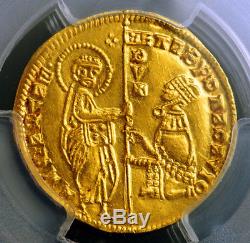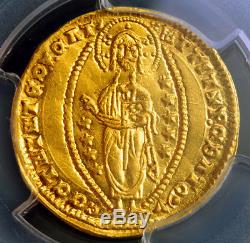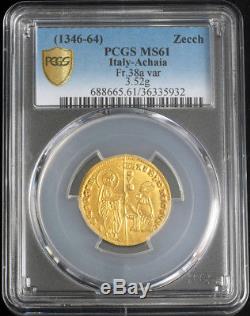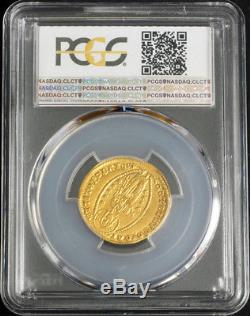1346, Italy, Duchy of Achaia, Robert of Anjou. Gold Zecchino Coin. PCGS MS-61





1346, Italy, Duchy of Achaia, Robert of Anjou. Ruler: Robert of Anjou (Duke of Achaia) Denomination: Gold Zecchino (Venetian Ducat) Condition. Certified and graded by PCGS as MS-61! Diameter: 20mm Weight: 3.52gm Material: Gold!
Mark standing right, presenting cross topped banner to kneeling Duke. Four pellets (privy mark) in upper field and inside banner above. Reverse: Christ standing facing, raising hand in benediction and holding Gospels. Halo of light (mandorla) with 9 stars around!
(Italian: Roberto d'Angiò), known as Robert the Wise (Italian: Roberto il Saggio; 1275 20 January 1343), was King of Naples, titular King of Jerusalem and Count of Provence and Forcalquier from 1309 to 1343, the central figure of Italian politics of his time. He was the third son of King Charles II of Naples and Maria of Hungary, and during his father's lifetime he was styled Duke of Calabria (12961309). Robert was born around 1275, the third son of the future Charles II of Naples (then heir apparent) and his wife Mary of Hungary. His father was the son of the King of Naples, Charles of Anjou, who had established an Italian realm nine years earlier in 1266. During the Sicilian Vespers in 1282 against his grandfather Charles, the little child Robert, aged only seven, was the hostage of Peter III of Aragon, his grandfather's enemy.
Three years later, his grandfather would die at the age of 59 at Foggia in Italy, when Robert was 10 years old, leading to his father (then a hostage) becoming King of Naples as Charles II, with Robert's elder brother, Charles Martel of Anjou as heir apparent. Charles Martel would have a son three years later, the future Charles I of Hungary, in 1288, making Robert an uncle at age 13. However, the Sicilian barons refused him and elected James' brother, Frederick II. The war continued, and with the Peace of Caltabellotta (1302) Robert and the Angevin dynasty lost Sicily forever, their rule limited to the south of peninsular Italy.Robert inherited the position of papal champion in Italy; his reign being blessed from the papal enclave within Robert's Provence, by the French Pope Clement V, who made him papal vicar in Romagna and Tuscany, where Robert intervened in the war of factions in Florence, accepted the offered signiory of that city, but had to abandon it due to Clement's opposition. The leader of the Guelph party in Italy, Robert opposed the sojourn of Emperor Henry VII in Italy (131113) and his occupation of Rome in 1312. After Henry's death, the Guelph reaction against the Ghibelline leaders in northern Italy, Matteo Visconti and Cangrande della Scala, made it seem for a time that Robert would become the arbiter of Italy.
Already ruler of wide possessions in Piedmont, Robert's prestige increased further when in 1317 the pope named him Senator of Rome, and when he became Lord of Genoa (131834) and Brescia (1319) and from 1317 onwards held the resounding papal title of vicar general of all Italy, during the absence in Italy of the Holy Roman Emperor, vacante imperio. In 1328 he fought another emperor who had ventured into Italy, Louis IV of Bavaria, and in 1330 forced John of Bohemia to quit northern Italy.Robert's hegemony in Italy was diminished only by the constant menace of Aragonese Sicily. When the succession to the margraviate of Saluzzo was disputed between Manfred V and his nephew Thomas II in 1336, Robert intervened on behalf of Manfred, for Thomas had married into the Ghibelline Visconti family. Robert advanced on Saluzzo and besieged it. He succeeded in taking it and sacking it, setting the city on fire and imprisoning Thomas, who had to pay a ransom.
The whole dramatic incident is recorded by Silvio Pellico. However, when his viceroy Reforza d'Angoult was defeated in the Battle of Gamenario (22 April 1345), Angevin power in Piedmont began to crumble. With his second wife Sancha of Majorca, Robert established the court of Naples as a center of early Renaissance culture and of religious dissent, supporting the Joachimite prophesies of the Spiritual Franciscans. At Robert's death in 1343, he was succeeded by his 16-year-old granddaughter, Joanna I of Naples, his son Charles having predeceased him in 1328. Joanna was already betrothed to her cousin, the 15-year-old Andrew of Hungary, son of the Angevin king of Hungary, Charles Robert. In his last will and testament Robert explicitly excluded the claims of Andrew of Hungary, clearly mandated that he become prince of Salerno and specified that Joanna alone assume the crown in her own right, to be succeeded by her legitimate offspring.If she were to die without heir, her younger sister Maria, newly named the duchess of Calabria, and her legitimate offspring would inherit the throne. There is no mention in the will that Andrew be crowned king; and this historiographical tradition is largely the result of later historians' accepting without examination the assertions of Hungarian royal propaganda following Andrew's murder at Aversa in 1345.
This propaganda, the Hungarian assault on Joanna following the murder of Andrew, and the invasion of the Regno by Louis I of Hungary eventually led to the end of Angevin rule in Naples. /, sometimes transliterated from Greek as Akhaia. , is one of the regional units of Greece.
It is part of the region of West Greece and is situated in the northwestern part of the Peloponnese peninsula. The Achaean League was a Hellenistic-era confederation of city states in Achaea, founded in 280/281 BC. It later grew until it included most of Peloponnese, much reducing the Macedonian rule in the area.
After Macedon's defeat by the Romans in the early 2nd century BC, the League was able to finally defeat a heavily weakened Sparta and take control of the entire Peloponnese. However, as the Roman influence in the area grew, the league erupted into an open revolt against Roman domination, in what is known as Achaean War. The Achaeans were defeated at the Battle of Corinth (146 BC), and the League was dissolved by the Romans. In AD 51/52, Lucius Junius Gallio Annaeanus was proconsul of Achaea, and presided over the trial of the Apostle Paul in Corinth.
This event provides a secure date for the book of the Acts of the Apostles within the Bible. Achaea remained a province of the Byzantine Empire after the fall of the western Roman Empire. In the 6th and 7th centuries, Slavs invaded the Peloponnese, and settled in parts of Achaea as well.
By the 9th century, the whole peninsula was under Byzantine control again. However, after the Fourth Crusade several new crusader states were founded in Greece. One of these was the Principality of Achaea, founded in 1205, which like the Roman province covered a much larger area than traditional Achaea. Achaea was recaptured by the Byzantine Empire by 1430, and became part of the Despotate of the Morea.The Despotate of the Morea fell to the Ottoman Empire in 1460. As a part of the Morean War, the Republic of Venice captured Achaea in 1687 and held it until 1715, when the Ottomans recaptured the Peloponnese. Under Ottoman rule, Achaea was part of the Morea Eyalet.
In the Greek War of Independence, Aigio was one of the first cities to be liberated by the Greeks and all of Achaea was liberated by the end of 1821. Achaea produced several heroes including Kanaris, Zaimis and Roufos and prime ministers of Greece including Andreas Michalakopoulos as well as some head of states. In the first administrative subdivision of independent Greece, Achaea was part of the Achaea and Elis Prefecture. This was divided into the prefectures of Achaea and Elis in 1899. Achaea and Elis were reunited in 1909, and split again in 1930.Tens of thousands were relocated to their camps in the suburbs of Patras and a few villages mainly within the coastline. One of the camps was named Prosfygika. The item "1346, Italy, Duchy of Achaia, Robert of Anjou. PCGS MS-61" is in sale since Tuesday, December 25, 2018.
This item is in the category "Coins & Paper Money\Coins\ World\Gold". The seller is "coinworldtv" and is located in Europe. This item can be shipped worldwide.- Certification: PCGS
- Certification Number: 36335932
- Grade: MS61
- Composition: Gold!
- Year: 1346-1364 AD

